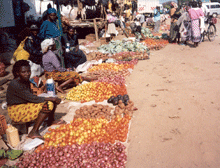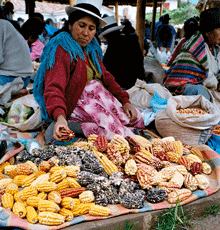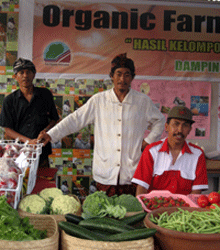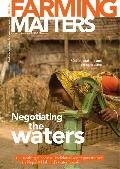Do markets work for small-scale farmers? HIVOS and IIED are planning a series of provocative seminars, to take place over the coming months, in order to encourage a debate on the policy priorities and practices around this controversial issue. These seminars will involve different stakeholders and will be reported on in this magazine. We asked different network members about the issues that need to be considered in this debate.
Susan Mwangi: “The importance of communications”

products at a very low price and then selling them on at a very high profit.
To maintain their profitable business, they frequently try to block the access of farmers in remote areas to large-scale buyers. “Small-scale farmers definitely want to have better access to national markets, and would also like to export their products. They know that they are being exploited by the middlemen and would want to avoid them and have access to markets directly, and thus get better prices for their products. Secure access to markets would encourage them to produce more, or to invest money.” But, first they need to know about the existing possibilities. Susan highlights the importance of information, as a major ingredient.
Recently there has been much interest in Kenya in using ICTs to provide this information, helping secure access to markets and also helping farmers get ideas and advice.
The Arid Lands Information Network has developed an online system that farmers can use to market their produce and link up with buyers. The system also makes it easier to transfer money to farmers. “More systems like this need to be developed to make it easier to sell off-farm produce and improve farmers’ livelihoods.”
Teresa Gianella: “The emergence of local organisations”

Teresa Gianella, editor of LEISA revista de agroecología, thinks that this has not changed in the last thirty years, in spite of the strong trend of urbanisation seen in the continent (as a result of which up to 75 percent of the population lives in urban areas). “The link between the rural areas and many urban citizens remains, and small-scale farmers provide most of their food, especially to households with lower incomes.”
What is visible nowadays is that small-scale farmers are now also accessing other markets. Whether this is through “ecological fairs” or through supermarkets or large retailers, there is an increasing demand for organic products from small-scale farmers. Much of this is the result of the efforts of farmers in establishing local organisations, and in working together to market their products.
“Working together can help farmers, for example, become certified organic, which brings many benefits.” But just as small-scale farmers are getting organised to sell their products, Teresa also points to the need of having consumer organisations which “can push for better policies, and thus ensure the supply of better products.”
Shintia Arwida: “Possibilities for fair prices”

Just as important, perhaps, is that many farmers owe money to these middlemen, so are obliged to sell their produce to them. In addition, farmers have very little information of what a fair price should be.
Although access to markets is an important issue for small scale farmers, many would say that their main problems are securing fertilizers, fighting pests and diseases, or the erratic weather. But farmers would definitely welcome fair prices and, in many ways, are struggling to get them.
Some initiatives show that this is possible, for example via co-operatives, a bidding system or via specific contracts for organic products. “The key factor is that farmers need to work together and search for information. Focusing on the local market can be a way of getting better prices, rather than focusing on trying to send their products abroad.”

